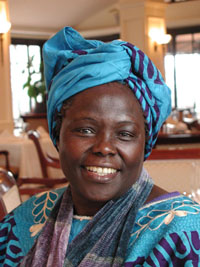
Wangari Maathai started a movement that planted 30 million trees in 20 countries. She campaigned for women’s rights and greater democracy in her country. She defied a corrupt regime, was vilified and forced to leave her country for some time and even assaulted by the police once.
Green Belt Movement
Wangari Maathai studied in the US and got a doctorate in biology from the University of Nairobi, the first woman in east and central Africa to do so. She was a Professor at the Nairobi University in Kenya when she launched the Green Belt Movement (GBM) in 1977. Her objective was to empower the people and to show that they can choose to destroy or build the environment. GBM encouraged poor women to plant millions of trees to combat deforestation and to get in return enough fuelwood.
The movement set up more than 5000 tree nurseries run by women and disabled persons. Seedlings are given free to groups and individuals. For every tree that survives for three months, the planter receives a small payment. By 1988, 40,000 people were planting trees and in due course the movement spread to many other African countries.
Wangari as an activist
Wangari came into limelight when she led a protest against the building of a 62-storey building in the middle of Freedom Park, Nairobi’s most popular public space. The then President, Daniel Arap Moi, labelled her and the GBM as subversive. Faced with intense persecution, she had to leave the country for a while. Her marriage broke up too.
When Wangari returned to Kenya, she took up the cause of political prisoners. She criticized the President for allowing deforestation and displacing people. Once, when she and a group of women were on a hunger strike demanding the release of political prisoners, the riot police came in and knocked her unconscious. Through all the persecution, Wangari stood solid and unbowed, like the trees she planted.
Nobel Prize
The political climate changed in Kenya in 2002, when Mwai Kibaki came to power. Wangari became a Member of Parliament and the new President appointed her as the Assistant Minister for Environment. In October 2004, she was awarded the Nobel Peace Prize for “her contribution to sustainable development, democracy and peace”. She was the first African woman to get this Prize.
Tragically, Wangari Maathai died of ovarian cancer in 2011.
Afterword: An earlier post presented the hummingbird story as narrated by Wangari Maathai. Her life demonstrated her message: “We should each do what we can.”
In 2012, the Collaborative Partnership on Forests, an international consortium of 14 organizations working on international forest issues, launched the inaugural Wangarĩ Maathai Forest Champion Award. The inaugural winner of the Award was Narayan Kaji Shrestha, a forestry activist from Nepal to recognize his efforts to promote community forest management. Kurshida Begum of Bangladesh received a special Honourable Mention prize. Also in 2012, a 2.7 acre community garden, called Wangari Gardens opened in Washington, DC., US.
Wangari’s memoir is titled Unbowed.

When one attempts to do something beyond the call of livelihood, conviction and determination sets in. Such ones, catapult to a formidable and no return point and it either becomes a movement, or people start emulating, looking at the hidden values of the act. Value proposition and value recognition often pops up in the midst of human fallacies, giving a jolt to humanity. I hope Wangari Maathai’s efforts will continue, despite the demonic virtues prevailing in our societies. The world order requires to be more sensitive if they really think of honouring efforts like that of Wangari Maathai.